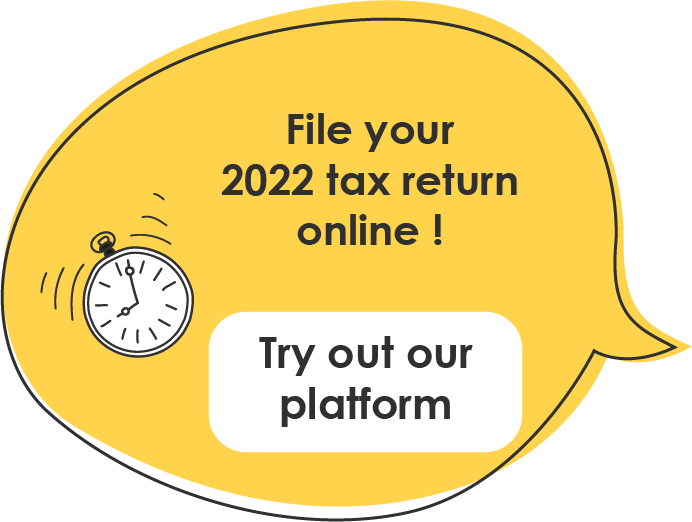 Written by Yanis Kharchafi
Written by Yanis KharchafiTax at source: The subsequent standard taxation (TOU)
This article aims to assist every taxpayer, whether you are a frontalier or not, as long as you are insured at source, in order to better understand what expenses are tax deductible and lower your tax burden.
The line-up:
What is subsequent standard taxation (TOU)?
In concrete terms, subsequent standard taxation is a tax principle. It allows you, provided that you meet certain requirements (mandatory for some, optional for others), to declare your income and assets at the end of the year, as would do a Swiss citizen or a person with a type C residence permit, even though you will have already paid your taxes at source.
What is the benefit of doing this?
In return, you will be allowed to claim all deductions authorised by the Confederation and the cantons.
And what purpose does that serve?
It allows for a more equal treatment between everyone who is in gainful employment.
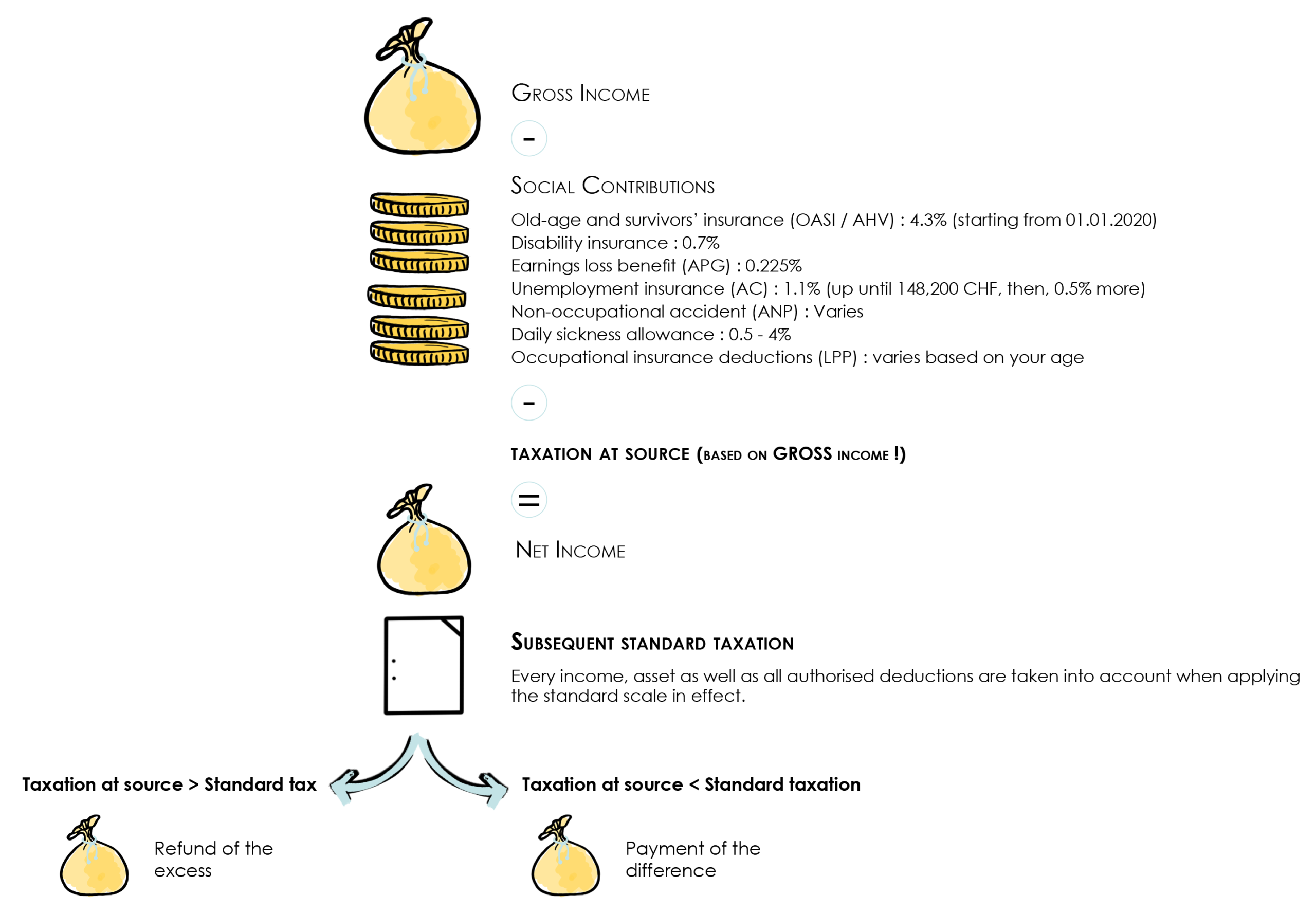
Subsequent standard taxation will in no case avoid at source tax from being withheld but will allow, subsequently, to see whether or not a difference between the standard tax and the amount withheld at source exists.
In case there is a difference, you tax buden will be adjusted in order for it to be equivalent to the standard tax.
- If the withholding tax paid is too low, you will have to pay the difference.
- If the withholding tax paid is higher, you will be refunded the difference.
If you are not obliged to do so, do not request a subsequent ordinary tax assessment if you have not simulated the result beforehand. It is not unusual for withholding tax to be preferable to ordinary tax.
If you opt for subsequent ordinary taxation, there will no longer be a difference between a person taxed at source, who would have been subject to a subsequent standard taxation, and a Swiss person or a person with a type C residence permit, taxed according to the standard procedure.
Swiss resident : when am I concerned with the subsequent standard taxation (TOU)?
The question is not whether you can request it or whether or not you must do it.
From the moment that you are in one of these three situations, you will be legally obliged to go through a subsequent standard taxation:
- Your individual income, regardless of whether you are married or not, is higher than 120,000 CHF gross per year.
- You have a taxable asset in your canton of residence.
- Vaud: CHF 57,999 for a single person / CHF 115,999 for a married or registered couple (in 2023)
- Geneva: CHF 83,398 for a single person, double for a married couple or a couple in a registered partnership CHF 166,797 without forgetting to add CHF 41,699 per child (in 2023)
- Valais: CHF 30,000 for a single person without children and double CHF 60,000 for a married couple or a registered partnership, and single-parent families.
- You have income that is not subject to at source taxation such as, for example: widow(er)’s pensions, incompe from self-employed income, real estate income, etc.

Furthermore, if you are still living with your partner and that one of you must go through a subsequent standard taxation process, then the entire household will have to comply with this rule, for life.
Small precision, if your future ex-partner ends up asking for divorce, then the law will impose that each ex-partner continues to go through the subsequent standard taxation process.
If you are not concerned by these three above-mentioned conditions, then you should know that the Confederation allows to you submit a voluntary request.
However, be cautious and do not forget to simulate your tax burden before and after this request because it is irreversible and will become mandatory for subsequent years.
Do not hesitate to get in touch with us in order to examine your situation and understand whether this turns out to be a good thing, before the irreparable happens.
Frontier worker : When am I concerned with the subsequent standard taxation (TOU)?
Do you also want to file a Swiss tax return in addition to the tax return in your home country? Don’t worry, you can also submit a subsequent standard taxation request as long as you meet the following condition: 90% of the household’s income must be taxable in Switzerland.
This is call having a quasi-resident status.
What does this mean? You must be able to prove that your overall household gross income :
- Income of the couple
- Income from movable assets
- Income from real estate
- Etc.
Is 90% taxable in Switzerland and not coming from Switzerland. The difference doesn’t seem to be huge, but it is not at all the same.
French resident – cross-border – single without children

Easy in this case, as the only source of income is taxable in Switzerland, it will be possible to request a subsequent ordinary taxation (TOU).
French resident – Cross border – Married with a person working in France
Much more complicated. Even if it is known that Swiss incomes are higher than French’s ones, they will quite easily represent more than 10%.

In this case… Impossible to request an TOU.
Single person without children resident in France and owner of real estate in France
If the property is rented, the income received during the year must be the applicable figure. On the other hand, if the property is not rented, the rental value will be applicable.

To end on a reassuring note, unlike the Swiss residents, a subsequent standard taxation will never be final, unless you keep the frontalier status.
Just a piece of advice: if you are eligible to do a subsequent standard taxation, start with simulating it in order to make sure it makes fiscal sense, or ask us about it.
Is a subsequent standard taxation (TOU) necessarily better than being taxed at source?
As you might expect, it is not possible to give you a clear answer. Since each household is different, answers have to be given on a case-by-case basis.
To do so, you have to look into various axes:
Your commune of residence
As you probably already know, in Switzerland, cantons and communes have a fair amount of freedom when it comes to taxation. They determine scales and deductions authorised for themselves.
This freedom will have a direct impact on the amount of taxes you will have to pay.
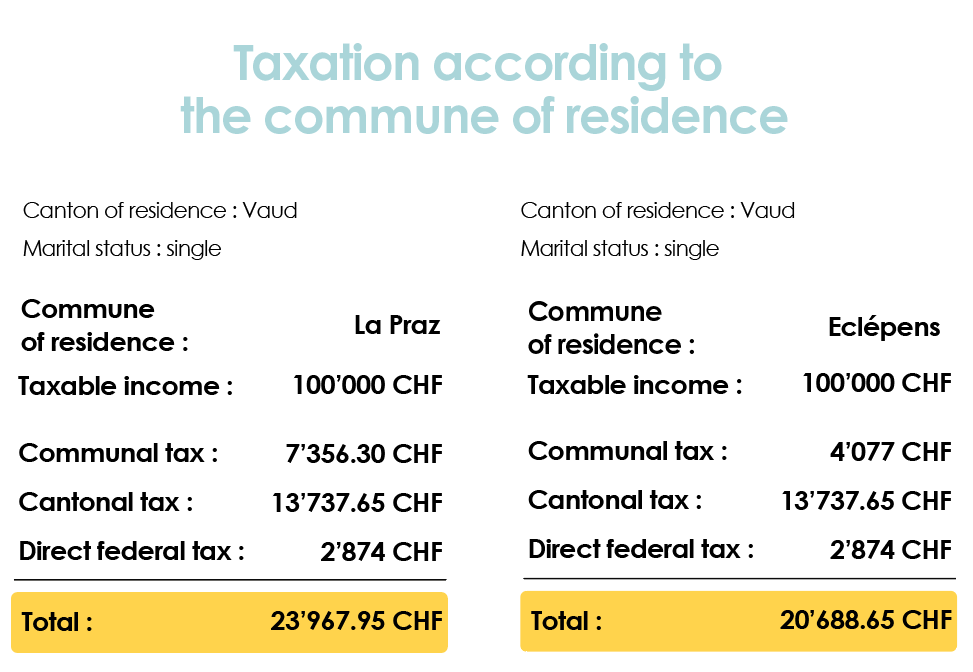
Your deductions
This is undoubtedly the most important point. Deductions are the kryptonites of taxes.
Depending on your expenses and your lifestyle, you will be able make a number of deductions, which will significantly affect your tax burden.
1 – Deductions taken directly off your salary (mandatory)
- Social deductions (AHV / OASI, LPP, accident insurance, etc…)
2 – Authorised deductions (optional)
- Professional deductions : Professional expenses, dual activity of the spouse, etc…
- Private provisions (pillar 3A)
- Mortgage rates
- Health insurances (sometimes, they are capped)
- LPP repurchases
- Transportations costs
- Meal expenses
- Etc…
Once you determined your taxable income, you will have a clear and precise idea of the impact your standard taxation will have on your tax burden.
An example is worth a thousand words : must Zoé really do a subsequent standard taxation?
Case 1 : Zoé with a pillar 3A + travel expenses + meal expenses
In the following example, we will look at the case of Zoé when she arrived to Lausanne on 1st January 2020.
Those were the good old days, she was 27 years old, had a great job paid 60,000 CHF per year and, opened a pillar 3A account, on which she had saved 4,000 CHF.
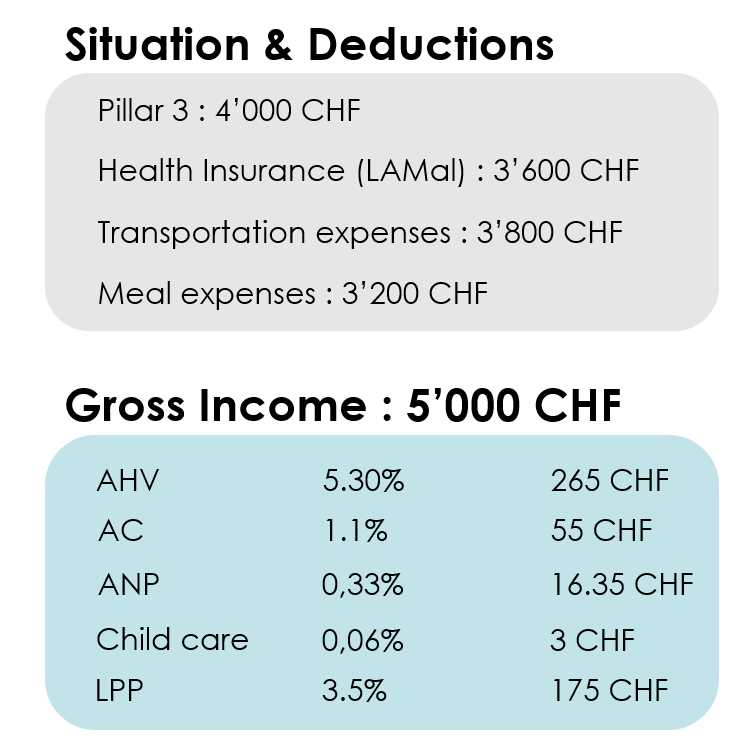
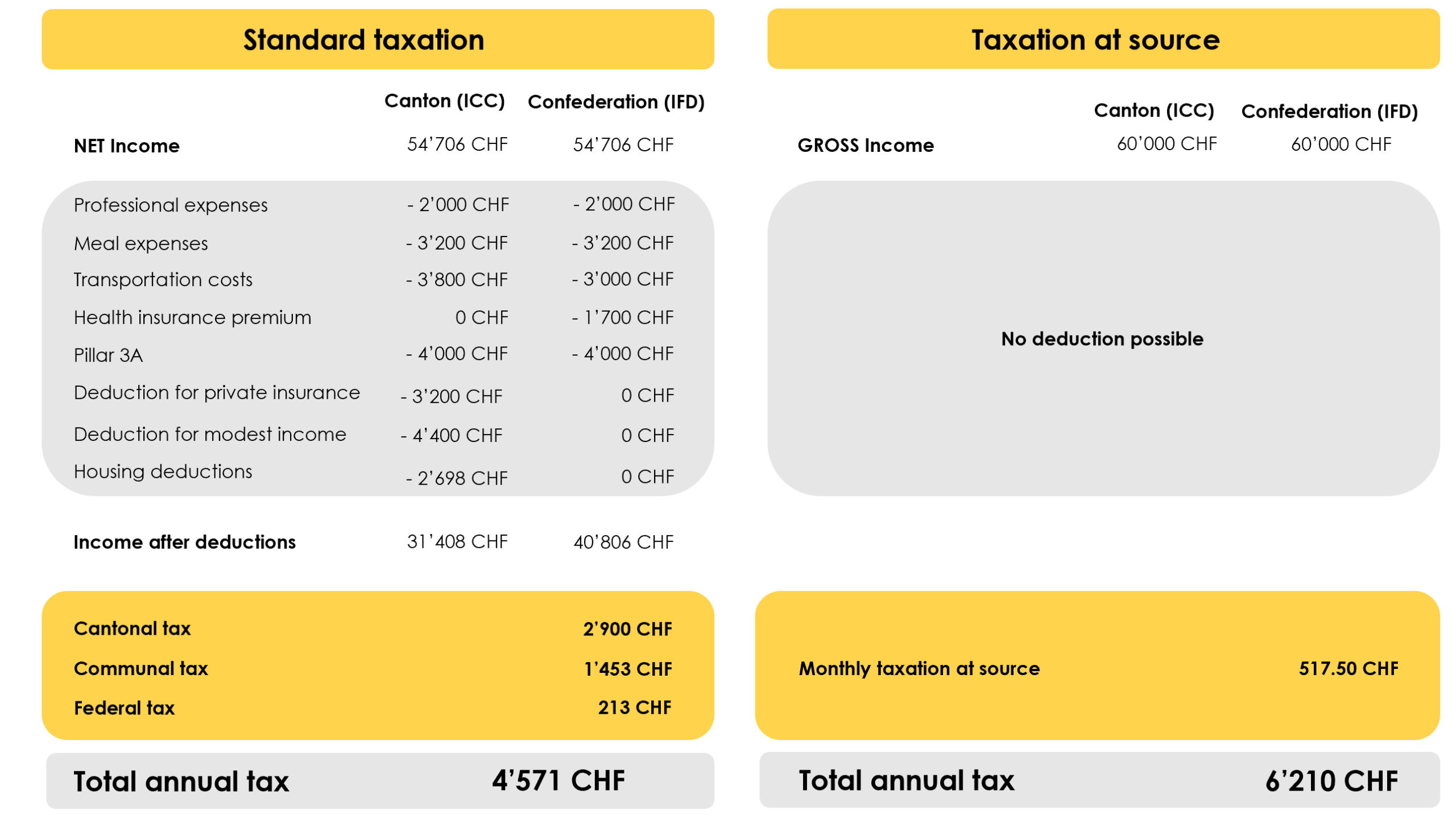
In this example, it is obvious that Zoé must submit a subsequent standard taxation request to save more than 1,200 CHF.
Case 2 : Zoé without a single deduction except for those granted off the bat because she worked remotely because of Covid!
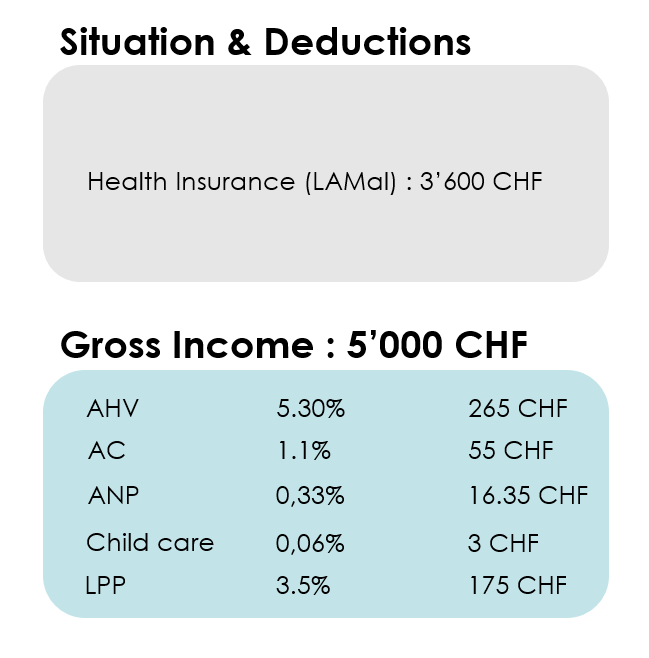
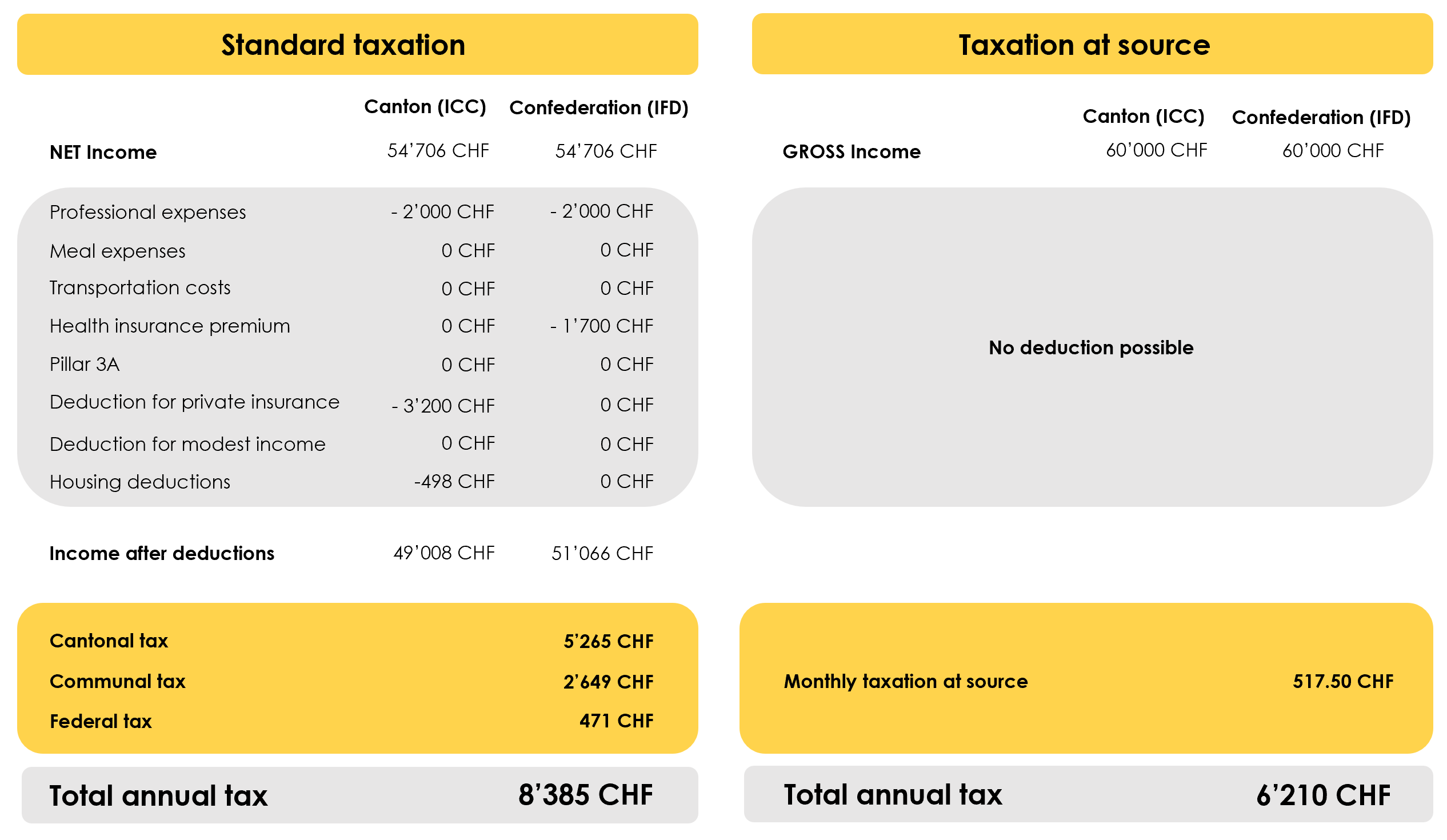
In this second example, Zoé was not only waisting her time, but also her money by being taxed standardly.
As the saying goes: knowledge is power and I now hope you know everything, otherwise, please do not hesitate to ask me!


